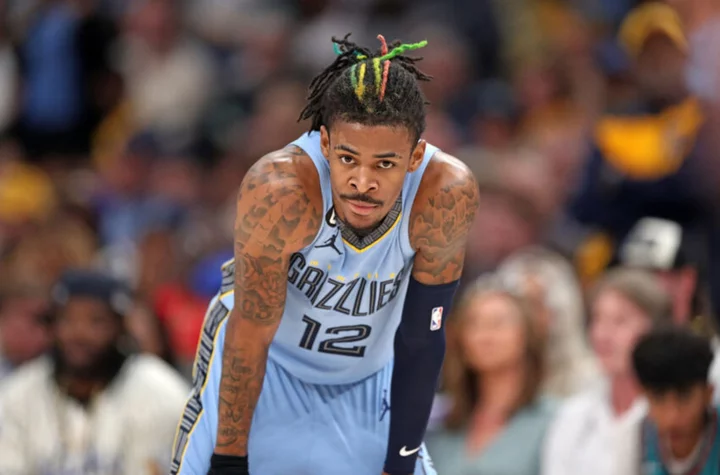Police in Memphis, Tennessee conducted a wellness check on Ja Morant after the Memphis Grizzlies star posted concerning comments on Instagram.
Memphis Grizzlies superstar Ja Morant has faced a great deal of scrutiny in recent months, which is why when Morant posted cryptic captions on Instagram, it was a cause for concern for the NBA community.
On Wednesday, Morant shared a series of photos and captions on his Instagram stories dedicated to his mother Jamie, his father Tee, and his daughter Kaari. "Love ya ma," the first caption read. "Love ya pops. You da greatest baby girl, love ya." Morant then posted a photo of himself with the caption, "Bye." Morant subsequently deleted the posts.
Considering the immense pressure and widespread criticism Morant has experienced recently, the emotional farewell messages were interpreted by some as a potential indication of ideating self-harm. Due to this concern, the Shelby County Sherriff's Office in Memphis, Tennessee conducted a wellness check on Morant to ensure that he was safe, according to TMZ.
"A spokesperson for the Shelby County Sheriff's Office said cops went to the NBA star's home in Tennessee shortly after Morant shared the concerning messages on his Instagram page… and they say he told them simply 'that he is taking a break from social media.'
'He is fine,' the spokesperson added."
Ja Morant clarified his cryptic social media post after police conduct a wellness check
Morant is currently suspended from all team activities after he was seen holding a firearm in an Instagram Live video. Morant released a statement via ESPN's Adrian Wojnarowski following the team suspension.
"I know I've disappointed a lot of people who have supported me. This is a journey and I recognize there is more work to do. My words may not mean much right now, but I take full accountability for my actions. I'm committed to continuing to work on myself."
Before this, Morant spoke in April about how his hand injury and NBA suspension in March had affected his mental health.
"It's very tough," Morant said about his mental health. "Stressful. Obviously, I feel like you guys can tell with my body language and stuff now. How, I'm pretty much taking what happened and I don't know man, I'm just pretty much numb to everything now. It's like, I'm not even surprised, it's one thing after another."
After the incident in March, Morant sought counseling services in Florida. At the time, Morant explained that he decided to seek counseling "to get help and work on learning better methods of dealing with stress and my overall well-being."
The negative effects of social media usage on mental well-being have been extensively documented by multiple academic research studies. According to a study conducted by MIT, "college-wide access to Facebook led to an increase in severe depression by 7 percent and anxiety disorder by 20 percent."
Alyson Watson, a former student-athlete who created the digital mental health resource company Modern Health, has spoken openly about how social media can amplify the pressure that high-profile athletes may feel from society.
"You weren't on Twitter for doing well or not doing well," Watson told Forbes. "Now there are entire Twitter feeds about how people are playing live on a court. We're tethered to technology, tethered to social media. There is more pressure on people than ever before."
"We get updates on our phone constantly – Twitter, LinkedIn, Facebook, Instagram. What we often see about everyone is this perfect story," Waston continued. "You don't see people updating their social media to say, 'Hey, I'm really struggling.' On one hand, all these amazing benefits from technology, you can argue have made a positive impact. But it has been a double-edged sword."
Professional and collegiate athletes have endeavored to reduce the stigma of mental health issues and crises in recent years, especially amid an increase in death by suicide among college athletes.
"At least five NCAA athletes ended their lives in a two-month period last year," CBS News reporter Debby Waldman reported in March. "And a 2021 NCAA poll released in May found that student-athletes say they are experiencing more mental health concerns, anxiety, and depression than they reported in surveys conducted before the covid-19 pandemic took hold in 2020.
Although Watson noted that most social media users don't openly ask for help on platforms, ideally, Morant will receive more support and compassion as he steps away from social media pressures.
Check out The Step Back for more news, analysis, opinion and unique basketball coverage. Don't forget to follow us on Twitter and Instagram and subscribe to our daily email newsletter, The Whiteboard.









